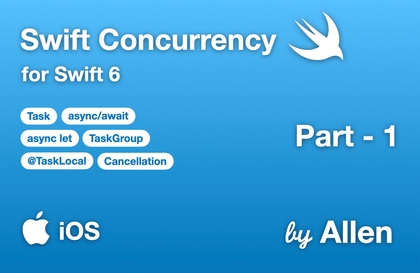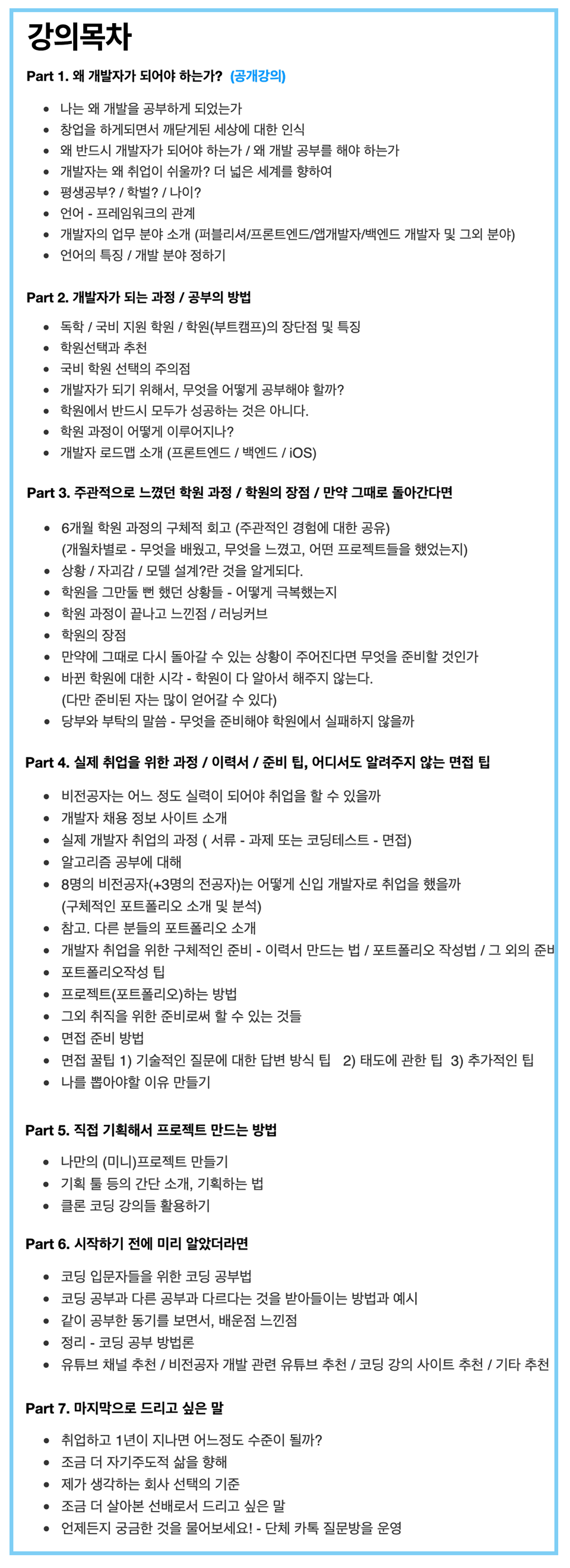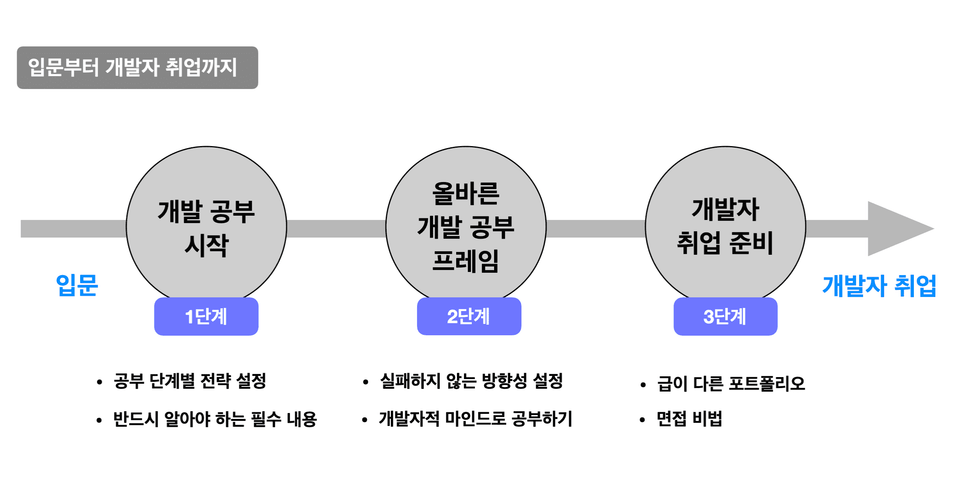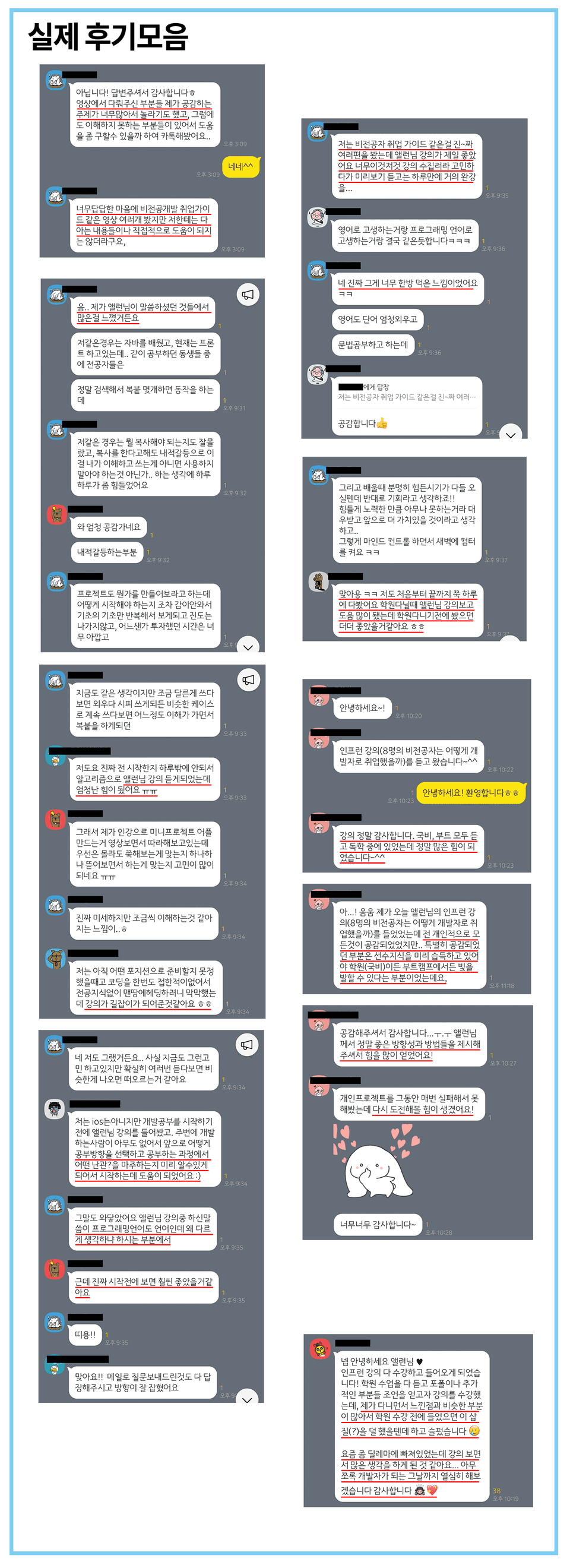
# Alan Swift Concurrency for Swift 6 (Part-1)
allen
$77.00
30%
$53.90
Basic / iOS, Swift, concurrent, async-await, concurrency
5.0
(61)
# Covering Swift Concurrency from A to Z (Part 1)
Basic
iOS, Swift, concurrent
How did 8 non-majors and 3 majors get jobs as developers? The process is covered in great detail and concretely.
먼저 경험한 수강생들의 후기
5.0
박코딩
First of all, my writing skills are not that great, so this may be a disorganized piece of writing, but I feel embarrassed but I want to leave an honest review because I received so much valuable information and a ray of light in my future development through this lecture. First of all, I left a comment on YouTube before the Inflearn lecture, and I was so grateful for the quick response. (I asked if my color blindness would interfere with front-end development, and he said it wasn't a big problem.) Separately from this, I thought that this was a lecture where I could greatly feel Alan's lecture planning and preparation throughout the lecture. In addition to the necessity of development, types of development, processes and methods, portfolios for practical job preparation, interview preparation, and more, he explained in detail not only iOS development but also other fields, and the content was very rich with extras and recommendations for various lectures. In addition, I was able to see tables, photos, videos, and actually written portfolios and completed apps, which was a great help in understanding. Above all, I think it will be a great help in the future study direction for people like me who are not majoring in development and are ignorant of development. I am currently a social worker (33 years old, 5 years in the workforce/expecting to quit in February). My wife started working as a coding instructor last year, and I became interested in coding. Since December of last year, I have been searching for developer information on Google, YouTube, and communities, but it was difficult to find a clear direction. In addition, I live in a rural area (Chuncheon), so there are almost no development companies, and I couldn't find anyone with a related major around me. Even if I went to a government-funded academy or boot camp, it would be too far to commute, and I couldn't even think about offline education due to COVID-19. Above all, I was having a hard time deciding which option to choose among self-study/government-funded academy/academy (boot camp), but it was really helpful to understand the 'context' after comparing the pros and cons of each study method. Also, there are many specific and detailed stories about the future direction of study, which will be of great help in putting it into practice, and there are many motivational stories in between, so I strongly recommend that those who are thinking about taking this lecture in the future take it without hesitation for too long. Above all, I will never forget Alan's words that 'it is possible if you never give up'. Thank you for creating such a great lecture. Lastly, I have a few questions: 1. If I were to study on my own, would you tell me a specific way to do a team project? 2. If I were to take a non-face-to-face online education, what is the Pacam Online course like? (It's hard to ask questions in the open chatroom, so I'm leaving it here ^^;)
5.0
nalgae1130
Hello, I am also a student who is probably taking classes at the same academy as you. I was worried about whether to take the class or not, but this lecture has such a deep resonance that it makes me dizzy. It feels like a senior who has walked the same path before me kindly and sincerely tells me how to walk the path. Thank you so much for the great lecture, and I will look for other lectures by you and listen to them.
5.0
only one
I wanted to learn development, but I always felt like my skills weren't improving. But after watching this lecture, I realized that the teacher had already experienced and overcome these feelings that I was currently feeling. It was incredibly helpful, and I was able to find my direction for studying development again. I finished the lecture in no time, and it was very impressive. Especially the part about not comparing yourself to others... and the flow of learning development.... I was so impressed, and I'm going to put it into practice! Thank you for the great lecture ^^
Detailed stories of 8 non-majors getting jobs as real developers
Operating a KakaoTalk group question room
Students - Email inquiries available at all times
The ultimate beginner's guide to becoming a developer that even non-majors can do!


We'll share the vivid stories of eight non-developer majors and three majors who landed jobs as developers in 2019 after a six-month academy program. We'll share the in-depth details of how we studied and what preparations we went through to land a job as a developer. I believe that by understanding the struggles and struggles I faced as a non-developer, you can reduce the amount of trial and error you'll face.
By changing your "developer mindset" to understand the big picture, I hope to reduce hundreds of hours of trial and error.

(Why We Fail at Learning Development)
1. I try to study with the same methods and direction as general academics.
2. They are constantly obsessed with theories and try to understand everything one by one .
3. Repeating the above, I try to make something and I don't feel satisfied or find it fun.
I felt that this was something that should definitely be covered in any introductory development course.
My lectures generally focus on WHY? rather than HOW?
(Because WHY is a great power to understand the context and it is the basis for you to make your own judgment.)

This lecture started with this question.
Recently famous private development academy A three- to six-month offline course costs roughly 7 to 8 million won. Adding in living expenses for a few months, the total easily exceeds 10 million won. But does spending all that money and studying hard guarantee a job as a developer? The answer is no. Even after spending that much money at such an expensive academy, over 25% of developers drop out midway through their development studies.
(At government-funded academies, the dropout rate is over 40%.)
Most academies don't offer classes tailored to non-majors, and instead move at an incredibly fast pace. Those who have at least studied grammar beforehand can at least keep up with the lessons. However, most academies, believing they'll be easy to understand from the start and entering without any preparation, end up giving up.
However, when promoting academies, you won't hear these kinds of practical stories. They'll just say things like 95% satisfaction, leaving out stories about actual dropouts and satisfaction surveys.
It's all just a marketing tool.
In reality, the level of satisfaction isn't that high. Of course, I started studying development at one of the most prestigious academies, paying a lot of money. I almost gave up on my development studies halfway through... I was at the bottom of my class. Every day, I wrestled with the idea of quitting my development studies.
I've thought countless times: "Is development just not for me?" "Is paying this much money and at this age, am I on the right path?" "Is development really this difficult?" But looking back, I realize it wasn't really a bad fit.
I had set the wrong direction for my development studies at the beginning.
This kind of direction setting wasn't taught even in academies. After countless failures, I realized while working on a project that I had set the wrong direction for my development studies. In class, I'll explain how I went wrong and how to steer clear of it, using specific examples. I'll delve into the process of becoming a developer, step by step. The primary goal of this course is to provide you with all the know-how you need to become a developer without going to an academy or spending a fortune. I'll provide practical and specific guidance at every step. By sharing my mistakes and concerns in advance, you can avoid the swamp of failure.
We want to reduce your chances of failure in your developer studies by 99%.
I believe anyone can become a developer, as long as they set their study direction correctly. I've seen countless people around me who started studying development but failed to become actual developers. But what if someone fails? It's probably because you've misunderstood the framework and direction of your development studies, which is what I'm trying to explain in this class. So, in this class, I'm going to show you exactly how to become a developer without failing.
If I could become a developer, you too The developer Will be I think it is possible.

[Non-majors know-how on every step of the way to becoming a developer]

(1) Development study related
(2) Changing the development study framework
(3) Related to developer job preparation
this every That Examples and For example Specifically I would like to inform you.
A perfectly differentiated portfolio example that will pass the 100% document screening.


Adding code to your portfolio isn't about showing off your development prowess. There's a point to be made here that needs to be clearly emphasized.
(These parts are covered in detail in the lecture.)
- In my class, I show you two portfolio examples that achieved 100% success in the document screening , and I cover in detail how to appeal to what makes you a differentiating developer.

We'll answer your questions until you land a job as a developer. Feel free to ask any questions you have. Due to physical limitations, we may have to respond all at once during business hours, but we'll do our best to provide you with feedback as quickly as possible.
"Getting a Job as a Non-Major Developer by Alan"
Group KakaoTalk link - https://open.kakao.com/o/g7nSauyc
(The participation code will be provided at the end of the lecture.)
Q. How is it different from other introductory developer courses?
First, I cover a lot of my experiences in becoming a developer. For each month (for example, each month) over the course of six months, I share what I learned, what challenges I faced, what mini-projects I worked on, what team projects I worked on, what I felt, why I almost gave up, what kept me going, and what results I achieved by persevering... I'll vividly share what I learned and felt along the way. That's why the lectures are a bit long. It might be a bit tedious, but if you experience this detailed process yourself, I believe your path as a developer will become easier. There's a world of difference between knowing the path and not. Above all, if you're currently studying, I'm confident you'll find it empowering. I was once one of the lowest-ranking students at my academy.
Second, I started studying programming at a very young age, after having founded two startups. (You probably won't find anyone older than me...) Before becoming a developer, I personally hired and worked with numerous developers while running a startup. From an interviewer's perspective, I'll share with you detailed resume writing tips for entry-level developers, including valuable tips you won't find anywhere else . I've reviewed hundreds of resumes and portfolios, not just for developers, but also for marketers, planners, designers, and more. I can confidently say I'll share my unique know-how, which you won't find on blogs or YouTube.
Third, I wanted to give a concrete example of what a developer mindset is. This was actually the most challenging part of my development studies. I felt that there was a clear difference between studying development and other disciplines. It's not simply a matter of the amount of work, but rather the direction of your development studies. Beginning with this understanding, rather than ignoring it, will save you the long hours of trial and error I experienced and that anyone can experience.
Fourth, I only covered the core content. If a lecture is considered good because it's long, it can be extended by adding unnecessary content. However, this course only covers the essential content for the development process. To avoid failure in your journey to becoming a developer, there are certain areas you must pay attention to. I've almost failed, and so have my friends. I believe that if you pay attention to these areas, anyone can avoid failure in becoming a developer. I focused on delivering that message. My lectures focus on the WHY rather than the HOW . I emphasize the WHY: why you should study in this way and why your portfolio should be appealing in this way. Many students have resonated with this content and have given it positive reviews. I hope you gain essential know-how through this course. :)
Fifth, you'll gain valuable insights into overcoming slumps and frustrations in your development studies. Anyone who studies development, even a non-major, will undoubtedly experience the question of whether they're studying properly . In fact, those who have been studying development for more than a few months often tell me they find the parts of my lectures incredibly relatable: the small tips on how to overcome frustrations that everyone experiences. I've experienced these moments countless times myself, and I'll share with you some tips based on my own experience on how to manage them and navigate them effectively.
📣 A preview lecture is ready!
• If you are not sure about the curriculum, please watch the preview lecture (free) that has been released first. ^^ I think it will be of some help in taking the lecture!

학습 대상은 누구일까요?
Anyone who is concerned about employment
For those who are concerned about how to study development
National scholarship academy student
Bootcamp student
Anyone curious about developer job portfolios
Anyone who wants to know developer job interview tips
선수 지식, 필요할까요?
doesn't exist!
7,578
수강생
751
수강평
310
답변
5.0
강의 평점
7
강의_other
I'm Allen, an iOS Developer.
https://www.youtube.com/@allen_ios
"Knowledge that is accurately understood must be easily explainable in one's own words." is my motto.
Therefore, I want to be a developer who can share knowledge in a language anyone can understand by simplifying the trial and error I experienced while studying.
I am not interested in creating courses that only teach easy topics superficially in a short amount of time.
While such courses can be churned out quickly, I believe that ultimately, "growing into a good developer" requires a solid foundation of theoretical knowledge.
Rather than just an easy course, my goal is to teach even the difficult concepts that one
must know to become a good developer (a developer who can grow continuously) as easily and intuitively as possible.
Thus, my objective is to build a foundation that allows you, not me, to contemplate and think about the "WHY" yourself.
Just as I strive to become a better developer tomorrow,
I want to convey the things I have pondered in great depth.
I believe that repeatedly failing interviews or being unable to express even simple concepts in your own words means you do not have a precise understanding of them. On the contrary, I believe that one can grow rapidly only when they have a "solid foundation" in basic concepts and CS.
👇🏻For inquiries, please contact me at the email address below.
we.love.code.allen@gmail.com
Language: Swift, Python, Java, C#
전체
25개 ∙ (강의상세_런타임_시간 강의상세_런타임_분)
전체
99개
4.9
99개의 수강평
수강평 1
∙
평균 평점 5.0
5
Hello, I am also a student who is probably taking classes at the same academy as you. I was worried about whether to take the class or not, but this lecture has such a deep resonance that it makes me dizzy. It feels like a senior who has walked the same path before me kindly and sincerely tells me how to walk the path. Thank you so much for the great lecture, and I will look for other lectures by you and listen to them.
수강평 1
∙
평균 평점 5.0
5
It didn't seem like a lecture where a college senior gave advice to a freshman who dreams of becoming a developer, rather than saying, "Do this, do that" or "What stack is needed to become a developer?" As a non-major, I was lost and just starting to find my direction to become a developer, but it was very helpful. Whenever I feel like giving up or having a hard time, I will listen to the words and study hard! Thank you :)
수강평 1
∙
평균 평점 5.0
5
First of all, my writing skills are not that great, so this may be a disorganized piece of writing, but I feel embarrassed but I want to leave an honest review because I received so much valuable information and a ray of light in my future development through this lecture. First of all, I left a comment on YouTube before the Inflearn lecture, and I was so grateful for the quick response. (I asked if my color blindness would interfere with front-end development, and he said it wasn't a big problem.) Separately from this, I thought that this was a lecture where I could greatly feel Alan's lecture planning and preparation throughout the lecture. In addition to the necessity of development, types of development, processes and methods, portfolios for practical job preparation, interview preparation, and more, he explained in detail not only iOS development but also other fields, and the content was very rich with extras and recommendations for various lectures. In addition, I was able to see tables, photos, videos, and actually written portfolios and completed apps, which was a great help in understanding. Above all, I think it will be a great help in the future study direction for people like me who are not majoring in development and are ignorant of development. I am currently a social worker (33 years old, 5 years in the workforce/expecting to quit in February). My wife started working as a coding instructor last year, and I became interested in coding. Since December of last year, I have been searching for developer information on Google, YouTube, and communities, but it was difficult to find a clear direction. In addition, I live in a rural area (Chuncheon), so there are almost no development companies, and I couldn't find anyone with a related major around me. Even if I went to a government-funded academy or boot camp, it would be too far to commute, and I couldn't even think about offline education due to COVID-19. Above all, I was having a hard time deciding which option to choose among self-study/government-funded academy/academy (boot camp), but it was really helpful to understand the 'context' after comparing the pros and cons of each study method. Also, there are many specific and detailed stories about the future direction of study, which will be of great help in putting it into practice, and there are many motivational stories in between, so I strongly recommend that those who are thinking about taking this lecture in the future take it without hesitation for too long. Above all, I will never forget Alan's words that 'it is possible if you never give up'. Thank you for creating such a great lecture. Lastly, I have a few questions: 1. If I were to study on my own, would you tell me a specific way to do a team project? 2. If I were to take a non-face-to-face online education, what is the Pacam Online course like? (It's hard to ask questions in the open chatroom, so I'm leaving it here ^^;)
Bakcoding! Please leave your email address at we.love.code.allen@gmail.com and I will reply by email. :)
수강평 3
∙
평균 평점 5.0
5
I wanted to learn development, but I always felt like my skills weren't improving. But after watching this lecture, I realized that the teacher had already experienced and overcome these feelings that I was currently feeling. It was incredibly helpful, and I was able to find my direction for studying development again. I finished the lecture in no time, and it was very impressive. Especially the part about not comparing yourself to others... and the flow of learning development.... I was so impressed, and I'm going to put it into practice! Thank you for the great lecture ^^
수강평 1
∙
평균 평점 5.0
지식공유자님의 다른 강의를 만나보세요!
같은 분야의 다른 강의를 만나보세요!
강의상세.할인문구
$176,544.00
25%
$8.80